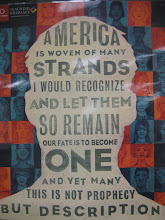Reflecting on Part One of Daniel H. Pink’s A Whole New Mind: Why Right-Brainers Will Rule the Future
“I am a Gemini”
So I was born in the middle of the year and in the middle of the month. I used to think this was ideal because it meant I got presents every six months, which is much better than having a birthday in, say, November. After Christmas you’d have to wait another eleven months to get more presents! But then I learned more about what being born in the middle of June means; it means I am a twin, a Gemini, a versatile communicator valuing relentless stimulation and expression. When I took personality quizzes in Seventeen magazine or even later when in undergrad I had to take the Myers-Briggs, I was never totally at one end of a spectrum. Am I more creative or intellectual? Intuitive or thoughtful? I used to think ending up in the middle meant I was bi-polar (OK, not really), but now I see this as a kind of balance that has benefitted me greatly in developing relationships with colleagues, students, and superiors alike. (In fact, I was just perusing astrology.com—no joke—and it said that Geminis “are fascinated by psychology and the way human relationships work”; this could not be more accurate.) So why do I even mention all of this? Because Pink’s A Whole New Mind is about precisely this: the difference between the right and left brains, the thinkers and the creators, the mathematicians and the artists--and what this difference implies for America's future. After having read Part One of his text, I am finding that I feel assured by his observations and predictions, and that makes me wonder the extent to which this relates to my “sign,” baby. Since the way of the future is apparently “high concept” and “high touch,” I can’t help but feel elated that what Pink describes as “the capacity to detect patterns and opportunities… to empathize with others, to understand the subtleties of human interaction, to find joy in one’s self and to elicit it in others” (p. 3) is exactly how I keep my own life interesting and fulfilling. Is it possible that my English major and music minor have prepared me for the future beyond my anticipation?
Further, I have to say that Pink’s opinion on America’s plenty—that “the defining feature of social, economic, and cultural life in much of the world is abundance” (p. 32)—makes total sense to me: It’s no wonder we are drifting further from a focus on reductive thinking when we can walk into any grocery store and have, like, seventeen different options for rice! As Pink mentions, having such abundance as “freed literally hundreds of millions of people from the struggle for survival” (p. 35), and I can only hope that while many American youth in particular have been “liberated by prosperity” they will continue to “not [be] fulfilled by it” (p. 35). As I continue to reflect on my educational philosophy and get involved in not-for-profit organizations like Ambassadors for Children, I am learning more and more about the importance of service learning; and as I continue to hear stories about kids in our own community who feel forced to steal from their peers and principals in order to help their parents make ends meet (true story), I know that although many of us are blessed with plenty, many more of us do still struggle for survival.
While Pink has some excellent food-for-thought, I think his bias is clear: The business of power. Look at the subtitle of the text: “Why Right-Brainers Will Rule the Future” (bold mine). And even the fact that his book has been a bestseller in BusinessWeek is telling. Is this a book meant to give readers a leg up on competition by prompting themselves to ask if they are cheap enough? Fast enough? In enough demand? (p. 51). Or will reading Pink encourage readers to find fulfillment and create meaningful context for their lives—in ways that help us to think beyond our abundance and toward the needs of others?
I am doubtful that Pink offers a philosophical blueprint in altruism, but I am only 93 pages in….
Pink, D. H. (2005). A Whole New Mind: Why Right-Brainers Will Rule the Future. New York: Riverhead Books.

No comments:
Post a Comment